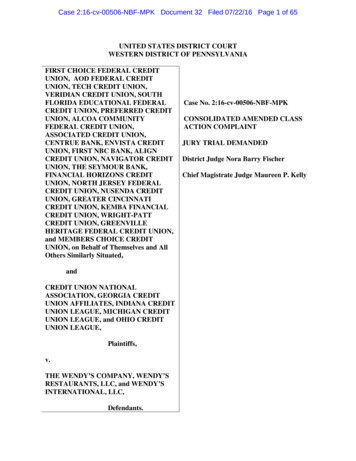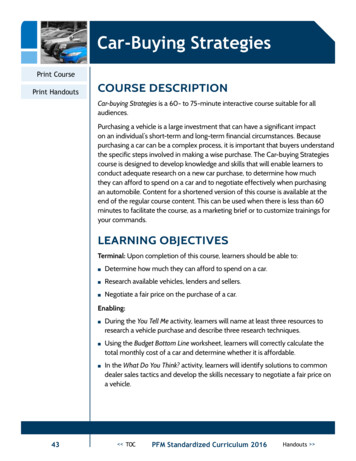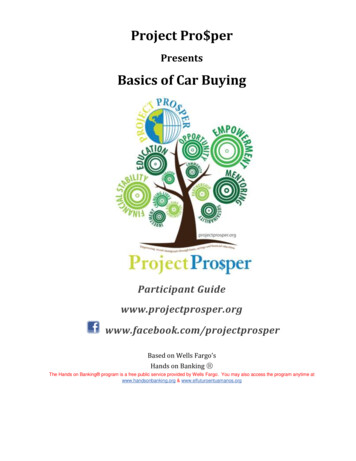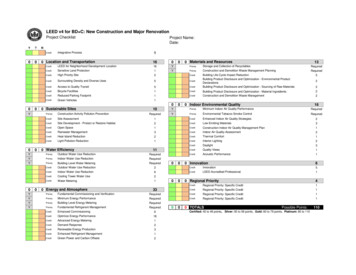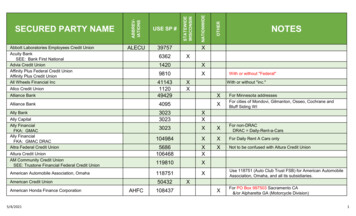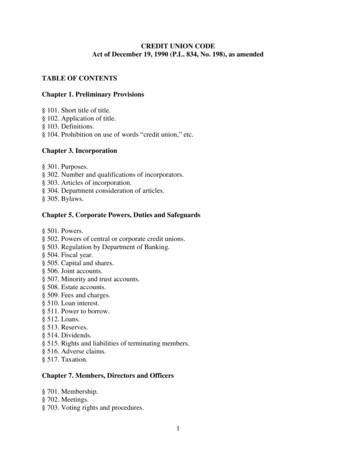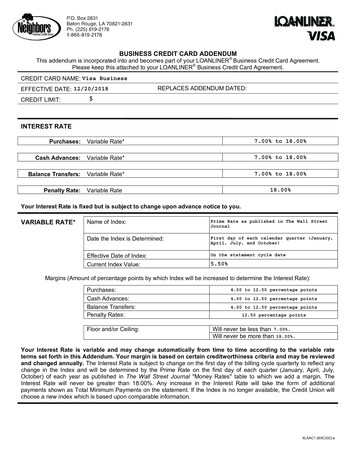
Transcription
Educators Credit UnionCARBUYINGGUIDEFIND THE PERFECTVEHICLE. SEE US FORTHE PERFECT LOAN.Achieving more together.262.886.5900 ecu.com
VEHICLE SOLUTIONS Is one of the ways that Educators Credit Union goes above and beyond forour members. Educators Vehicle Solutions is our answer to the many “painpoints” of buying or leasing a vehicle — whether it’s negotiating the cost, thefeeling of being manipulated or pressured, or just not knowing if you reallygot the “best” price. We created Vehicle Solutions as a free resource to helpyou find new and used vehicles that fit your lifestyle and stay within yourbudget.Through our exclusive network of more than 100 dealers, Vehicle Solutionsis prepared to help with the entire car-buying process including: obtaining aloan or lease through Educators, assessing the value of a trade-in, explainingwarranty service agreements to extend your vehicle’s manufacturer warrantyand giving you buying tips that will save you even more money!We created this guide to take you through the complete car-buying processand explain how Educators Vehicle Solutions can assist you. Please contactus with your questions or to get the process started.The Educators VehicleSolutions TeamOur Educators VehicleSolutions team hasmore than 53 years ofcombined experience!Contact us:262.884.6675vehiclesolutions@ecu.com
TABLE OFCONTENTSBefore you go shopping 15 things to consider when choosing a vehicle 2Trading in? How to get the most for your trade in 4Research, research, research! 5Buying vs. leasing a vehicle 7What to expect at a dealership 9Making the purchase 10Maintenance 11
BEFORE YOUGO SHOPPINGTaking a few practical steps before you goshopping for a vehicle helps protect you frommaking poor financial decisions in the heat ofthe moment.your budget and your monthly payment. It iscrucial to be honest about your budget andyour financial priorities when buying a newvehicle.Before buying a vehicle, it’s important toconsider your budget. While none of us havea crystal ball, it’s fair to ask some predictivequestions that relate to your overall financialhealth: How secure is your job? Do you have acushion of cash to use for emergencies? Do youforesee any other high-cost items that you willhave to budget for in the near future?Weighing all of these factors as you create avehicle short list will help make the experienceof owning and paying for your new vehicle apositive one.If buying a new vehicle makes financial sensefor you, know how much you can afford andthen get pre-approved for a car loan. Doingthis removes the guesswork from what youwill pay each month for your new vehicle. It’salso key to remember that there are costsabove and beyond the car payment itself –your choice of car may also affect the amountyou spend on fuel (gas, diesel or electric),insurance and vehicle maintenance. Be sureto consider these factors as you narrow downyour focus to models and ages of cars. Don’tforget to consider your down payment. Puttinmoney down can make a real difference toDID YOU KNOW?A variety of financial calculators canbe found at: ecu.com/calculatorsOnce your budget is in order, it’s time tofind your ideal car! Buying a car can be anintimidating and time-consuming experience.The Educators Vehicle Solutions departmentwas created to help you buy the car that’s rightfor you. We can assist you every step of theway. All we need is an idea of what you arelooking for, and we will do our best to make ithappen.VEHICLE SOLUTIONSCAN HELP YOU: Locate a vehicle that fits yourneeds and keeps you in-budget. Shop through our exclusivedealer network of more than 100dealerships. Get a great deal with negotiatedpricing on new vehicles in ournetwork. Assist you in negotiating the bestprice on used vehicles. Avoid costly add-ons. 1
FIVE THINGS TOCONSIDER WHENCHOOSING A VEHICLEIf you’ve already come up with a suitable budget for your car search, what else is important toremember when choosing your next vehicle?Using the list of make/models that you’ve built around your needs:1.2.2 Weigh the costs and benefits of a newvehicle versus a used one. The value lostwhen you drive a new car off the lotmay not be as steep as it once was, butit remains a significant consideration.However, a full vehicle warranty that canback up your purchase for 36,000-100,000miles along with the improved longevity oftoday’s new cars may balance that loss.Know the fair price for each car on yourlist. Manufacturer websites provide theMSRP for new vehicles and Kelly BlueBook has you covered for used cars. Youcan also use Educators’ vehicle researchtool, AutoSMART, on ecu.com. These toolscan help you anchor your negotiations ifyou elect not to have Educators assist youwith your car search. If the vehicle's pricetag at the dealership deviates radicallyfrom the price you found during yourresearch, that could be a reason to askyourself if something isn't quite right.3.Review Consumer Reports, CARFAX andother feedback on used vehicles, or workwith Educators Vehicle Solutions. Beingaware of issues or accident repairs oncertain models will help you eliminatespecific vehicles from your shopping listor revise your list of what you’re willing topay for.4.Take a test drive. A new car can take someadjusting – instruments in unexpectedplaces and a different placement relativeto the road can feel strange at first. Bewilling to drive a given model or car morethan once to be sure that your impressionof it is accurate. Take your time, settle inand focus on:
a.Comfort and noise – check outdifferent road surfaces if possible andthink about whether any shortcomingsin comfort or road noise occur underthe conditions you drive in most often.b.Acceleration – whether making a lefthand turn or getting up to highwayspeed, you want to know that yourexpectations match the car’s abilities.c.Braking – braking should yield asmooth change in speed, withoutvibration through the pedal ordeviation from straight-line travel.d.General handling and visibility — besure to test the maneuvers you’lluse most often, such as u-turns andparallel parking, and consider thecharacteristics of the car, like blindspots, responsiveness to change ofdirection, and ease and safety ofinstrumentation while driving.5.Listen to your gut or the advice of aneutral party like Educators VehicleSolutions. Ultimately, if something aboutthe car or deal (including the dealer)doesn’t feel right, follow that instinct.It’s better to start over or lose a car toanother buyer than commit to somethingthat makes you uneasy. However, anxietyabout making a major purchase may bethe source of your qualms. Bring a friendor family member to help you out, and relyon the resources available to you throughEducators to give you honest feedback. 3
TRADING IN? HOW TO GET THEMOST FOR YOUR TRADE-INThe best advice about trading your car in, truthfully, is to avoid it. You’ll almost always make moreof a profit by selling your car on your own. Trading your old vehicle in makes negotiating a dealfor your new car harder. You have to negotiate the price of your new car and the price of yourold vehicle as well. Trading your car in also gives the dealer an opening to inject more profit intothe deal by low-balling your car. It’s a little more work to sell your car privately, but it is usuallyworth the extra effort. If you opt to sell privately, you will want to make sure you are gainingenough profit to offset any tax savings you might lose. An Educators Vehicle Advisor can guideyou through the process.If you decided to trade in your car, follow these steps to ensure you get afair deal:Start with solid information about what your old car is worth.The easiest way to do this is to get an appraisal from Educators VehicleSolutions. If you cannot get your vehicle to Educators, we can do anassessment over the phone to give you a good idea of what to expect at thedealership, or CarMax can evaluate your car, identify any major problemsand make you an offer that is good for seven days.Once you know what your vehicle is worth, it’s time to head to the dealer.You should always negotiate the price for your new car before discussingyour trade. Dealers prefer to negotiate both prices at the same time,giving them the ability to play the numbers off each other. You’re under noobligation to tell the dealer you have a trade prior nor are you obligated totrade in the end. If they ask about a trade, simply tell them you’ll talk aboutthe trade-in after you’ve come to terms on the new purchase.Ask for a purchase contract that reflects your final negotiations.Once you’ve come to an agreement on both the amount you will pay forthe new vehicle and the trade value, renewing the contract is a must. Lookfor “add-ons” the dealer might include on the contract, and make sureeverything on the contract had been discussed before and is what youagreed to. It’s always best to set the closing for another day or time to giveyourself a chance to review all terms without the pressure of being at thedealership. You can also bring your contract to Educators to get advice andcompare loan rates and terms.4
RESEARCH, RESEARCH, RESEARCH!We understand that buying a vehicle is a major life event. We want to make your car-buyingexperience hassle-free. But we also know that sometimes you want to be able to figure thingsout for yourself. That’s why we also provide great resources to help you, free of pop-up ads andmisleading links.EDUCATORS VEHICLE SOLUTIONS ONLINEVisit ecu.com/car-buying where you can have all of our car-buying tools at yourfingertips.Watch videos, research vehicles, check out helpful resources and much more.AUTOSMART BY EDUCATORSResearching and finding the right vehicle is easy with AutoSMART by Educators.AutoSMART by Educators’ website has the tools to help you compare vehicles, get thebest payment or finance options, research trade-in values and more. Get started atecu.com/autos.AUTOWERKS PRE-OWNED AUTO SALES*AutoWerks is our preferred dealership for used vehicles. They offer haggle-freepricing, a 60-day limited warranty, a three-day return policy and a no-pressure buyingexperience. They are conveniently located next door to the Educators Credit Unionbranch on 90th Street in Sturtevant.Take a look at their inventory in-person or online at myautowerks.com.*AutoWerks is an Educators Credit Union preferred dealership. Educators has no ownership of this dealership.PRICESWe’ve already mentioned a few resources to help you compare vehicle prices, butEducators Vehicle Solutions might just be your most reliable resource.First, we explain all the costs involved in a vehicle purchase — MSRP prices, “list”prices, taxes, titles, invoice prices, and additional warranties and products that can beconfusing and bust your budget. Then, Vehicle Solutions crunches the numbers on loans,leases, payments, rebates, interest rates, and more to work out both the best deal andthe payment that fits your budget. 5
CARFAX When you find a used vehicle you are interested in, you can get a complete CARFAXVehicle History Report on that specific car. Visit www.ecu.com/vehicle to request yourreport.Educators Vehicle Advisors can be contacted by phone 262.884.6675 or emailvehiclesolutions@ecu.com.DID YOU KNOW?CARFAX is free for members atEducators Credit Union!VEHICLE SOLUTIONSCAN HELP YOU: Make valuable comparisons Learn the ins and outs of financing Get the most for your trade-in Evaluate an auto loan vs. a lease Avoid costly dealership add-ons Understand your money-savingwarranty options6
BUYING VS.LEASING A VEHICLEGuidance on the relative merits of buying or leasing a vehicle can be confusing, so let’s start withthe understanding of payments. Each payment is made up of a “base” and some interest.BASEINTERESTLOANPAYMENTValue of the loan Loan term (usually 4-6 years)Calculated on theoutstanding loan principalLEASEPAYMENTExpected depreciation ofvehicle over lease term Loan term (usually 3 years)Calculated on theoutstanding vehicle value —usually called “rent charge”The base price will usually bemuch lower in the lease scenariothan in a traditional loanBecause the base on thelease is lower, the outstandingprincipal stays higher whichmeans a lower payment butmore interest is accrued overthe life of the contract 7
Don’t forget to consider equity as well! Witha loan, you accrue equity as you pay it offbeyond its value. With a lease, equitygrows much more slowly, if at all, so itmay be non-existent.There are more variables than that – eachtransaction may have some fees, though leaseshave a reputation for more of them.Other caveats of leases:§ Most will require you to choose yourmileage limit and will charge you extra forexceeding the limit.§ Most will charge you for anything theyconsider “excessive” wear and tear.§ A dealer may offer a remarkably lowmonthly lease price with a “cap cost” upfront. If there is a cap cost reduction, divideit by the lease term and add the result tothe advertised monthly payment to get youractual monthly cost of the vehicle.All other things being equal, a lease willusually cost more than a loan in the long term.In the near term, the payments will be lower.Leasing may be right for you if having a newor near-new car is particularly important or ifyou drive a predictable number of miles peryear and reliably keep your vehicle in goodcondition. If you own a business and expect touse your vehicle primarily in that context, alease may be tax-deductible (consult with yourfinancial advisor about your situation).If your primary motive for considering alease is a lower monthly payment, it maybe the better financial choice to elongatethe loan term or try to raise more cash fora down payment on a traditional purchase.It is certainly worth running a few differentscenarios to compare and contrast the fullrange of costs.DID YOU KNOW?Educators Vehicle Solutions canhelp you get the best deal for yoursituation. Many parts of a leaseagreement are negotiable, andthere are ways to shift some of thatlonger-term cost in your favor!8
WHAT TO EXPECTAT A DEALERSHIPSales representatives are at the dealership toanswer questions, so ask away! If you don’tunderstand what’s on the sticker, ask forclarification. Some sales reps may want toshow you something different, so just makesure the vehicles are truly comparable.Take cars for a test drive – it’s the only wayyou’ll know if you like the way a certain carperforms on the road.If the sales rep insists you talk with a financemanager, be sure to take a step back and askyourself if you’re prepared for the negotiationprocess and all the pricing jargon before youdive in. Remind yourself that you can stepaway at any time. It’s recommended to alwaysschedule the closing for a date in the futureto give yourself a chance to review the termsand pricing on your own or with an EducatorsVehicle Advisor. Ask Vehicle Solutions for adealership’s pre-agreed price or assistance ondeciding what to pay.Educators Vehicle Solutions can help you:§ Learn dealership jargon and the real price of“hidden costs”.§ Avoid illegitimate fees charged bythe dealership.§ Secure pre-negotiated prices throughour dealership contacts.§ Purchase any vehicle you like withoutthe hassle.Vehicle Solutions will ALWAYS give youunbiased advice on any vehicle and explainyour buying options. Educators VehicleAdvisors are not sales people – they are hereto educate and advise as a service to ourmembers.Contact Educators Vehicle Solutions:262.884.6675 or vehiclesolutions@ecu.com 9
Making the purchaseYou found your vehicle and agreed on a price – you’re ready to make the purchase. If you werepre-approved at Educators, paperwork will be a breeze.If you’re going to lease your vehicle through Educators Credit Union, we will have everything puttogether for you. If you still need to apply for a loan, we will get you started and, in most cases,you’ll find out if you’re approved the same day. Either way, you will soon drive away with your newvehicle – congratulations!Remember, Educators will: Help you research vehicles Show you the tools to research on yourown – AutoSMART by Educators(ecu.com/autos) Find the right vehicle for you Explain everything to you throughout thecar-buying process Make sure you get the best pricing Always be there to help!10
MAINTENANCENow that you’ve closed on your new car, let’s take a look at how you can keep it humminghappily for as long as possible with these maintenance tips to make your new (or new-to-you)vehicle last longer.MAKE FRIENDS WITH YOUR OWNER’S MANUALYour owner’s manual contains your recommended maintenance schedule. It’simportant to embrace this for several reasons. Prime among them is that carsdiffer, and your manual will let you know when your car should have systemsflushed, tires rotated, and parts inspected, lubricated and/or replaced.Oil changes are not what they used to be. It’s crucial to view the owner’s manualto make sure you are keeping up to date with oil changes according to your make/model. Many cars now have an on-board oil life monitoring system. Most newercars can go anywhere from 5,000 to 15,000 miles between oil changes, especiallywhen using synthetic oils. Only feel compelled to shorten the interval whenyou drive under severe conditions, like frequent idling or stopping and going,extreme cold/heat/dust or frequent trailer towing.WASH IT OFTEN, ESPECIALLY IN THE WINTERThink about what accumulates on your vehicle throughout the winter seasonand consider how it’s wearing and tearing on your car’s body. When the weatheris above freezing, drive through the car wash and pay the extra for the underbody wash. This will go a long way to help preserve your car cosmetically andmechanically.MAKE A HABIT TO LOOK YOUR CAR OVER ON A REGULAR SCHEDULEYou took a lot of time to decide on what vehicle you wanted to purchase or lease,so you should take care of it, right? Give or take, every six months inspect yourvehicle – walk all the way around, turn the lights on, check the tire pressure, andlook for anything that seems out of the ordinary and then follow up on it.SUBSCRIBE TO VEHICLE (AND RELATED PRODUCT) RECALLSVisit www-odi.nhtsa.dot.gov/subscriptions and sign up for recall noticesvia email for your vehicles, tires and child restraints. 11
Achieving more together.262.886.5900 ecu.com
vehicle short list will help make the experience of owning and paying for your new vehicle a positive one. Once your budget is in order, it's time to find your ideal car! Buying a car can be an intimidating and time-consuming experience. The Educators Vehicle Solutions department was created to help you buy the car that's right for you.
